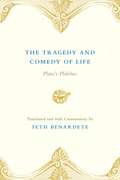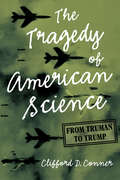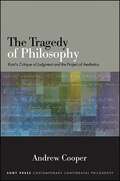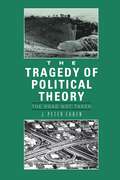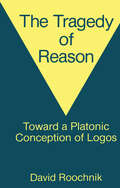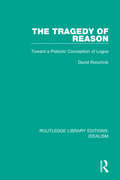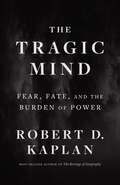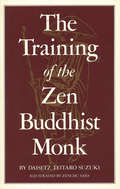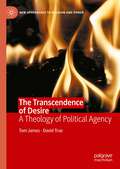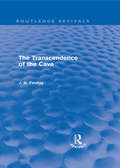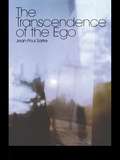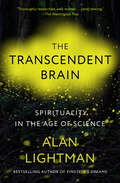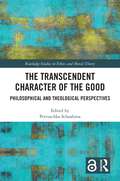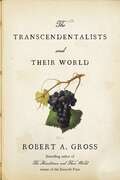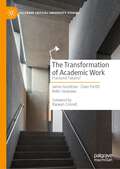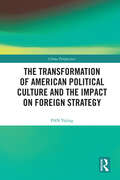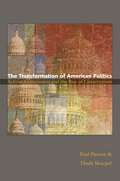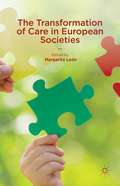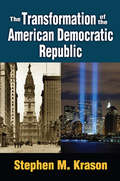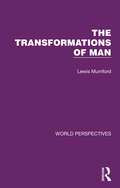- Table View
- List View
The Tragedy and Comedy of Life: Plato's Philebus
by Plato Seth Benardeten The Tragedy and Comedy of Life, Seth Benardete focuses on the idea of the good in what is widely regarded as one of Plato's most challenging and complex dialogues, the Philebus. Traditionally the Philebus is interpreted as affirming the doctrine that the good resides in thought and mind rather than in pleasure or the body. Benardete challenges this view, arguing that Socrates vindicates the life of the mind over the life of pleasure not by separating the two and advocating a strict asceticism, but by mixing pleasure and pain with mind in such a way that the philosophic life emerges as the only possible human life.
The Tragedy of American Science: From Truman to Trump
by Clifford D. ConnerA look at the destructive history of science-for-profit, including its toll on the US pandemic response, by the author of A People&’s History of Science. Despite a facade of brilliant technological advances, American science has led humanity to the brink of interrelated disasters. In The Tragedy of American Science, historian of science Clifford D. Conner describes the dual processes by which this history has unfolded since the Second World War, addressing the corporatization and the militarization of science in the US. He examines the role of private profit considerations in determining the direction of scientific inquiry—and the ways those considerations have dangerously undermined the integrity of sciences impacting food, water, air, medicine, and the climate. In addition, he explores the relationship between scientific industries and the US military, discussing the innumerable financial and human scientific resources that have been diverted from other critical areas in order to further military aggrandizement and technological development. While the underlying problems may appear intractable, Conner compellingly argues that replacing the current science-for-profit system with a science-for-human-needs system is not an impossible utopian dream—and the first step to a better future is grappling with the mistakes of the past.
The Tragedy of Philosophy: Kant's Critique of Judgment and the Project of Aesthetics (SUNY series in Contemporary Continental Philosophy)
by Andrew CooperIn The Tragedy of Philosophy Andrew Cooper challenges the prevailing idea of the death of tragedy, arguing that this assumption reflects a problematic view of both tragedy and philosophy—one that stifles the profound contribution that tragedy could provide to philosophy today. To build this case, Cooper presents a novel reading of Immanuel Kant's Critique of Judgment. Although this text is normally understood as the final attempt to seal philosophy from the threat of tragedy, Cooper argues that Kant's project is rather a creative engagement with a tragedy that is specific to philosophy, namely, the inevitable failure of attempts to master nature through knowledge. Kant's encounter with the tragedy of philosophy turns philosophy's gaze from an exclusive focus on knowledge to matters of living well in a world that does not bend itself to our desires. Tracing the impact of Kant's Critique of Judgment on some of the most famous theories of tragedy, including those of G. W. F. Hegel, Friedrich Nietzsche, Martin Heidegger, and Cornelius Castoriadis, Cooper demonstrates how these philosophers extend the project found in both Kant and the Greek tragedies: the attempt to grasp nature as a domain hospitable to human life.
The Tragedy of Political Theory: The Road Not Taken
by J. Peter EubenIn this book J. Peter Euben argues that Greek tragedy was the context for classical political theory and that such theory read in terms of tragedy provides a ground for contemporary theorizing alert to the concerns of post-modernism, such as normalization, the dominance of humanism, and the status of theory. Euben shows how ancient Greek theater offered a place and occasion for reflection on the democratic culture it helped constitute, in part by confronting the audience with the otherwise unacknowledged principles of social exclusion that sustained its community. Euben makes his argument through a series of comparisons between three dramas (Aeschylus' Oresteia, Sophocles' Oedipus Tyrannos, and Euripides' Bacchae) and three works of classical political theory (Thucydides' History and Plato's Apology of Socrates and Republic) on the issues of justice, identity, and corruption. He brings his discussion to a contemporary American setting in a concluding chapter on Thomas Pynchon's The Crying of Lot 49 in which the road from Argos to Athens, built to differentiate a human domain from the undefined outside, has become a Los Angeles freeway desecrating the land and its people in a predatory urban sprawl.
The Tragedy of Reason: Toward a Platonic Conception of Logos (Routledge Library Editions: Idealism Ser.)
by David RoochnikFirst Published in 1991. This book attempts to defend a conception of reason—or to use the Greek word "logos"—that I contend can be extracted from the dialogues of Plato. The very notion of defending Plato may seem strange. Why would a philosopher enshrined for centuries as "classic" need a defense? A defense against whom and what charge? What does it mean to defend an author so long dead? Can he somehow be revived? In other words, what significance can a defense of Plato possibly attain for a contemporary audience?
The Tragedy of Reason: Toward a Platonic Conception of Logos (Routledge Library Editions: Idealism)
by David RoochnikThe classical conception of reason (or logos) has been repeatedly attacked in the modern era. Its enemies range from Descartes, who complains that logos is not sufficiently useful or precise, to Derrida who hopes to liberate Western thought from its bondage to "logocentrism." At least since the time of Nietzsche, Plato has been damned as the chief architect of the classical conception of logos. He is accused of overvaluing reason and thereby devaluing the other, more human aspects of life. As it was originally formulated in Nietzsche’s The Birth of Tragedy, Plato has been taken to be the arch-enemy of tragedy, which for Nietzsche was the most life-affirming of all the art forms of Greek culture. Originally published in 1990, The Tragedy of Reason defends Plato against his accusers. Employing a mode of exposition which exhibits Plato’s position, Roochnik presents the Platonic conception of logos in confrontation with texts by Homer, Hesiod, Heraclitus, Aristotle, Descartes, Porty, and Derrida. In clear language, unencumbered by technical terminology, Roochnik shows that Platonic conception of logos is keenly aware of the strength of its opponents. The result is a presentation of Plato as a "tragic philosopher" whose conception of logos is characterized by an affirmation of its own limits as well as its goodness.
The Tragic Mind: Fear, Fate, and the Burden of Power
by Robert D. KaplanA moving meditation on recent geopolitical crises, viewed through the lens of ancient and modern tragedy “Classical drama provides crucial lessons for policymakers. . . . A road map for effective, well-considered policy.”—Kirkus Reviews Some books emerge from a lifetime of hard-won knowledge. Robert D. Kaplan has learned, from a career spent reporting on wars, revolutions, and international politics in Europe, the Middle East, and East Asia, that the essence of geopolitics is tragedy. In The Tragic Mind, he employs the works of ancient Greek dramatists, Shakespeare, German philosophers, and the modern classics to explore the central subjects of international politics: order, disorder, rebellion, ambition, loyalty to family and state, violence, and the mistakes of power. The great dilemmas of international politics, he argues, are not posed by good versus evil—a clear and easy choice—but by contests of good versus good, where the choices are often searing, incompatible, and fraught with consequences. A deeply learned and deeply felt meditation on the importance of lived experience in conducting international relations, this is a book for everyone who wants a profound understanding of the tragic politics of our time.
The Training of the Zen Buddhist Monk
by Daisetz Teitaro SuzukiDaisetz Teitaro Suzuki's The Training of the Zen Buddhist Monk invites you to step inside the mysterious world of the Zendo, where monks live their lives in simplicity. Suzuki, best known as the man who brought Zen classics to the West, sheds light on all phases of a monk's experience, from being refused admittance at the door to finally understanding the meaning of one's "koan". Suzuki explains the initiation ceremony, the act of begging, and the life of prayers, meditation, and service.
The Training of the Zen Buddhist Monk
by Daisetz Teitaro SuzukiDaisetz Teitaro Suzuki's The Training of the Zen Buddhist Monk invites you to step inside the mysterious world of the Zendo, where monks live their lives in simplicity. Suzuki, best known as the man who brought Zen classics to the West, sheds light on all phases of a monk's experience, from being refused admittance at the door to finally understanding the meaning of one's "koan". Suzuki explains the initiation ceremony, the act of begging, and the life of prayers, meditation, and service.
The Training of the Zen Buddhist Monk
by Daisetz Teitaro SuzukiDaisetz Teitaro Suzuki's The Training of the Zen Buddhist Monk invites you to step inside the mysterious world of the Zendo, where monks live their lives in simplicity.This is perhaps the best introduction to Zen and the life of the Zen monk. By means of a direct and succinct description of the training that a Zen Buddhist monk undergoes, Dr. Suzuki has given us the most precise picture possible of Zen in life.The forty-three illustrations give a unique value to the book. The artist, Zenchu Sato has depicted here the record of his own experiences in going through all the disciplinary measures pertaining to the life of Zen.As author, Dr. Suzuki said, "Zen ought to be studied not only in its theoretical aspects, as a unique product of the Oriental mind, but in its practical aspect as it is to be seen in the Zendo life. This is the chief motive for my writing this book."
The Transcendence of Desire: A Theology of Political Agency (New Approaches to Religion and Power)
by Tom James David TrueThe “secular age” is not a smooth, untroubled process of accumulation and advance but an uneven and unpredictable series of clashes of interest. Charles Taylor’s “immanent frame” cannot be construed merely as a phenomenon within religion and culture but urgently needs to be understood in political and economic terms–i.e., as a class project. The failure of the secular, vividly displayed in the crumbling legitimacy of global institutions and in the spectacle of police violence, both calls for and makes possible a renewal of political agency. Tom James and David True argue that a theology of the cross has a distinctive potential today: it can pierce the sacred aura of normalcy around the consensual anti-politics of the neoliberal order so that a vision of a world beyond today’s racialized capitalism can emerge. But they contend that we don’t need to forsake the emancipatory aims of modernity nor retreat to local communities. As an alternative to these weak strategies, they offer a constructive and cruciform account of political agency that includes both prophetic resistance and practical wisdom, each embedded in contemporary struggles for freedom that, they argue, embody divine desire for a common world.
The Transcendence of the Cave: Sequel to The Discipline of the Cave (Routledge Revivals)
by John Niemeyer FindlayFirst published in 1967, The Transcendence of the Cave is the second in a series of Gifford Lectures on philosophical issues, and continues the themes of the first series entitled The Discipline of the Cave. In the opening chapters, J N Findlay sketches an ontology, an axiology and a theology which are ‘phenomenological’ in the sense of Husserl, as they attempt to show that a ‘firmament’ of logical and other values emerges out of the contingencies of first order liking and interest. The synthesis of these values in an object having many paradoxical, mystical-religious properties is also a necessary outcome of this ‘logic’. In the later chapters, the author attempts to construct an orderly picture of other worldly experiences and their objects based solely on the premise that these experiences must be such as to resolve the many philosophical surds that plague us in this life.
The Transcendence of the Ego: A Sketch for a Phenomenological Description
by Jean-Paul SartreFirst published in France in 1936 as a journal article, The Transcendence of the Ego was one of Jean-Paul Sartre's earliest philosophical publications. When it appeared, Sartre was still largely unknown, working as a school teacher in provincial France and struggling to find a publisher for his most famous fictional work, Nausea.The Transcendence of the Ego is the outcome of Sartre's intense engagement with the philosophy of Edmund Husserl, the founder of phenomenology. Here, as in many subsequent writings, Sartre embraces Husserl's vision of phenomenology as the proper method for philosophy. But he argues that Husserl's conception of the self as an inner entity, 'behind' conscious experience is mistaken and phenomenologically unfounded.The Transcendence of the Ego offers a brilliant diagnosis of where Husserl went wrong, and a radical alternative account of the self as a product of consciousness, situated in the world.This essay introduces many of the themes central to Sartre's major work, Being and Nothingness: the nature of consciousness, the problem of self-knowledge, other minds, anguish. It demonstrates their presence and importance in Sartre's thinking from the very outset of his career.This fresh translation makes this classic work available again to students of Sartre, phenomenology, existentialism, and twentieth century philosophy. It includes a thorough and illuminating introduction by Sarah Richmond, placing Sartre's essay in its philosophical and historical context.
The Transcendent Brain: Spirituality in the Age of Science
by Alan LightmanFrom the acclaimed author of Einstein&’s Dreams comes a rich, fascinating answer to the question, Can the scientifically inclined still hold space for spirituality? &“Lightman…belongs to a noble tradition of science writers, including Oliver Sacks and Lewis Thomas, who can poke endlessly into a subject and…stir up fresh embers of wonder.&” —The Wall Street JournalGazing at the stars, falling in love, or listening to music, we sometimes feel a transcendent connection with a cosmic unity and things larger than ourselves. But these experiences are not easily understood by science, which holds that all things can be explained in terms of atoms and molecules. Is there space in our scientific worldview for these spiritual experiences? According to acclaimed physicist and novelist Alan Lightman, there may be. Drawing on intellectual history and conversations with contemporary scientists, philosophers, and psychologists, Lightman asks a series of thought-provoking questions that illuminate our strange place between the world of particles and forces and the world of complex human experience. Can strict materialism explain our appreciation of beauty? Or our feelings of connection to nature and to other people? Is there a physical basis for consciousness, the most slippery of all scientific problems? Lightman weaves these investigations together to propose what he calls &“spiritual materialism&”— the belief that we can embrace spiritual experiences without letting go of our scientific worldview. In his view, the breadth of the human condition is not only rooted in material atoms and molecules but can also be explained in terms of Darwinian evolution. What is revealed in this lyrical, enlightening book is that spirituality may not only be compatible with science, it also ought to remain at the core of what it means to be human.
The Transcendent Character of the Good: Philosophical and Theological Perspectives (Routledge Studies in Ethics and Moral Theory)
by Petruschka SchaafsmaThis volume addresses issues of moral pluralism and polarization by drawing attention to the transcendent character of the good. It probes the history of Christian theology and moral philosophy to investigate the value of this idea and then relates it to contemporary moral issues. The good is transcendent in that it goes beyond concrete goods, things, acts, or individual preferences. It functions as the pole of a compass that helps orient our moral life. This volume explores the critical tension between the transcendent good and its concrete embodiments in the world through concepts like conscience, natural and divine law, virtue, and grace. The chapters are divided into three parts. Part I discusses metaphysical issues like the realist nature and the unity of the good in relation to philosophical, naturalist, and theological approaches from Augustine to Iris Murdoch. The chapters in Part II explore issues about knowing the transcendent good and doing good, exemplified in the delicate balance between divine command and human virtuousness. Early Protestant theological views prove to be excellent interlocutors for this reflection. Finally, Part III focuses on how transcendence is at stake in two heavily debated moral issues of today: euthanasia and the family. The Transcendent Character of the Good will be of interest to scholars and advanced students working in theological ethics, moral philosophy, and the history of ethics. The Open Access version of this book, available at www.taylorfrancis.com, has been made available under a Creative Commons Attribution-Non Commercial-No Derivatives 4.0 license.
The Transcendentalists and Their World
by Robert A. GrossWhy Concord? How did a small and seemingly quiet village in the hinterlands of Boston become, by popular reckoning, the birthplace of two revolutions--the American War of Independence that began with shots fired by the local Minutemen, and the American Renaissance of literature and thought that began with the Transcendentalists' challenge to established pieties? In The Transcendentalists and Their World, the distinguished historian Robert A. Gross gives a rich and beautifully detailed account of the town that Ralph Waldo Emerson, Henry David Thoreau, Nathaniel Hawthorne, and the Alcotts called home. Their Concord, he shows, was primed for revolt, and was hardly a sleepy, bucolic place fit only for poets and philosophers. The Transcendentalists and their neighbors lived in an age of transformation. A place of more than two thousand souls in the antebellum era, Concord was a community in ferment, one whose small, ordered society, founded by Puritans and defended by Minutemen, was dramatically unsettled by the expansive forces of capitalism and democracy while the town became more tightly integrated with the wider world. These changes posed a challenge to a society built on inherited institutions and involuntary associations as citizens placed a new premium on autonomy and choice. Concord was ripe for Emerson and Thoreau. This book is both an intimate journey into the life of a town and a searching cultural study of major American writers as they plumbed the reaches of the universe for spiritual truths--and took stock of the rapidly changing contours of their surroundings. It shows us familiar literary figures alongside their neighbors--white and Black, devout and blasphemous, and situated at every level of the social order--and it reveals how this common life in Concord entered powerfully into their works. No American community has been recovered so richly and located so meaningfully within the larger American story. ROBERT A. GROSS is the James L. and Shirley A. Draper Professor of Early American History Emeritus at the University of Connecticut. He is the author of The Minutemen and Their World (1976), which won the Bancroft Prize, and of Books and Libraries in Thoreau's Concord (1988); with Mary Kelley, he is the coeditor of An Extensive Republic: Print, Culture, and Society in the New Nation, 1790-1840 (2010). A former assistant editor of Newsweek, he has written for such periodicals as Esquire, Harper's Magazine, The Boston Globe, and The New York Times, and his essays have appeared in The American Scholar, The New England Quarterly, Raritan, and The Yale Review.
The Transformation of Academic Work: Fractured Futures? (Palgrave Critical University Studies)
by James Goodman Keiko Yasukawa Claire ParfittThis book offers a unique grounded analysis of recent crises and transformations in academic work. It charts international and Australia-based efforts to overcome academic fragmentation and precarity, and to advance agendas for the public university. It is based on extensive qualitative interviews with academics and managers across several universities in Australia. It finds new grounds for ‘universal’ universities, with decent jobs, to serve the public good. The book is aimed at students and scholars from sociology, education, politics and industrial relations, and a wider readership concerned about the future of universities. Analysis centres on a trade union-led initiative in Australia aimed at decasualising universities, and ensuing debates about the impact of academic fragmentation. The authors argue for strengthening the teaching/research nexus as the foundation-stone for public purpose universities.
The Transformation of American Political Culture and the Impact on Foreign Strategy (China Perspectives)
by PAN YalingThis book examines the interplay between political culture and diplomatic strategy in the U.S., revealing the transformation of American political culture and its impact on the country's foreign strategy. The theoretical pivot of this study is an analysis of the dynamics of political culture and the mechanisms of the interaction between political culture and diplomatic strategy. Given this premise, the core chapters revisit the historical transformations of American political culture and analyze the responses and countermeasures taken to attempt to reverse the perceived decline in American hegemony during the presidencies of George W. Bush, Barack Obama, and Donald Trump, factors interwoven with security, economic, and institutional crises. The discussion describes the landscape and evolution of contemporary American political culture and the correlated adjustments of U.S. global strategy over the course of the twenty first century. Given the myriad of challenges and political legacies left by its predecessors, the author gives a pessimistic prognosis of the prospect of resolving America's political plight by the Joe Biden administration. The title will be a valuable reference for academic and general readers interested in American politics, U.S. diplomatic strategy, and international relations.
The Transformation of American Politics: Activist Government and the Rise of Conservatism (Princeton Studies in American Politics: Historical, International, and Comparative Perspectives #94)
by Paul Pierson and Theda SkocpolThe contemporary American political landscape has been marked by two paradoxical transformations: the emergence after 1960 of an increasingly activist state, and the rise of an assertive and politically powerful conservatism that strongly opposes activist government. Leading young scholars take up these issues in The Transformation of American Politics. Arguing that even conservative administrations have become more deeply involved in managing our economy and social choices, they examine why our political system nevertheless has grown divided as never before over the extent to which government should involve itself in our lives. The contributors show how these two closely linked trends have influenced the reform and running of political institutions, patterns of civic engagement, and capacities for partisan mobilization--and fueled ever-heightening conflicts over the contours and reach of public policy. These transformations not only redefined who participates in American politics and how they do so, but altered the substance of political conflicts and the capacities of rival interests to succeed. Representing both an important analysis of American politics and an innovative contribution to the study of long-term political change, this pioneering volume reveals how partisan discourse and the relationship between citizens and their government have been redrawn and complicated by increased government programs. The contributors are Andrea Louise Campbell, Jacob S. Hacker, Nolan McCarty, Suzanne Mettler, Paul Pierson, Theda Skocpol, Mark A. Smith, Steven M. Teles, and Julian E. Zelizer.
The Transformation of Care in European Societies
by Margarita LeónThis book aims to explore the nature and extent of the 'care deficit' problem in European societies and how effective the different care systems are in dealing with these problems through policy innovation. It combines theoretical and conceptual debates, cross-national comparisons and analytically-driven case studies.
The Transformation of Mathematics in the Early Mediterranean World: From Problems to Equations
by Reviel NetzThe transformation of mathematics from its ancient Greek practice to its development in the medieval Arab-speaking world is approached by focusing on a single problem proposed by Archimedes and the many solutions offered. From a practice of mathematics based on the localized solution (originating in the polemical practices of early Greek science), we see a transition to a practice of mathematics based on the systematic approach (grounded in the deuteronomic practices of Late Antiquity and the Middle Ages). A radically new interpretation is accordingly offered of the historical trajectory of pre-modern mathematics.
The Transformation of the American Democratic Republic
by Stephen M. KrasonIn this stimulating volume, Stephen M. Krason considers whether the Founding Fathers' vision of the American democratic republic has been transformed and if so, in what ways. He looks to the basic principles of the Founding Fathers, then discusses the changes that resulted from evolving contemporary expectations about government. Referencing philosophical principles and the work of great Western thinkers, Krason then explores a variety of proposals that could forge a foundation for restoration.Acknowledging that any attempt to revive the Founders' views on a democratic republic must start in the public sphere, Krason focuses on concerned citizens who are aware of the extent to which our current political structures deviate from the Founders' vision and want to take action. Ultimately, a democratic republic can exist, be sustained, and flourish only when there is a deep commitment to it in the minds and norms of its people.Written by a foremost authority in the field of US Constitutional law, this book will appeal to those interested in American history, society, and politics.
The Transformation of the American Democratic Republic
by Stephen M. KrasonIn this stimulating volume, Stephen M. Krason considers whether the Founding Fathers' vision of the American democratic republic has been transformed and if so, in what ways. He looks to the basic principles of the Founding Fathers, then discusses the changes that resulted from evolving contemporary expectations about government. Referencing philosophical principles and the work of great Western thinkers, Krason then explores a variety of proposals that could forge a foundation for restoration.Acknowledging that any attempt to revive the Founders' views on a democratic republic must start in the public sphere, Krason focuses on concerned citizens who are aware of the extent to which our current political structures deviate from the Founders' vision and want to take action. Ultimately, a democratic republic can exist, be sustained, and flourish only when there is a deep commitment to it in the minds and norms of its people.Written by a foremost authority in the field of US Constitutional law, this book will appeal to those interested in American history, society, and politics.
The Transformations of Man (World Perspectives #7)
by Lewis MumfordOriginally published in 1957, this volume compares the 20th Century transformation of human life to the revolution which swept early man into the first civilized communities. It shows how each radical new stage of human development grew out of changes in human personality and consciousness, such as the invention of language and symbols, the origins of universal religions and the mechanization of everyday life. Despite the threat that the author foresees from an over-reliance on automation, the book maintains that humanity still has the means, spiritual, personal and technological to create a sustainable future for itself, by increasing the usefulness and freedom of all men.
The Transformative Mind
by Anna StetsenkoThe book suggests a transition from a relational worldview premised on the socio-political ethos of adaptation towards a transformative worldview premised on the ethos of solidarity and equality. Expansively developing Vygotsky's revolutionary project, the Transformative Activist Stance integrates insights from a vast array of critical and sociocultural theories and pedagogies and moves beyond their impasses to address the crisis of inequality. This captures the dynamics of social transformation and agency in moving beyond theoretical and political canons of the status quo. The focus is on the nexus of people co-creating history and society while being interactively created by their own transformative agency. Revealing development and mind as agentive contributions to the 'world-in-the-making' from an activist stance guided by a sought-after future, this approach culminates in implications for research with transformative agendas and a pedagogy of daring. Along the way, many key theories of mind, development and education are challenged and radically reworked.
